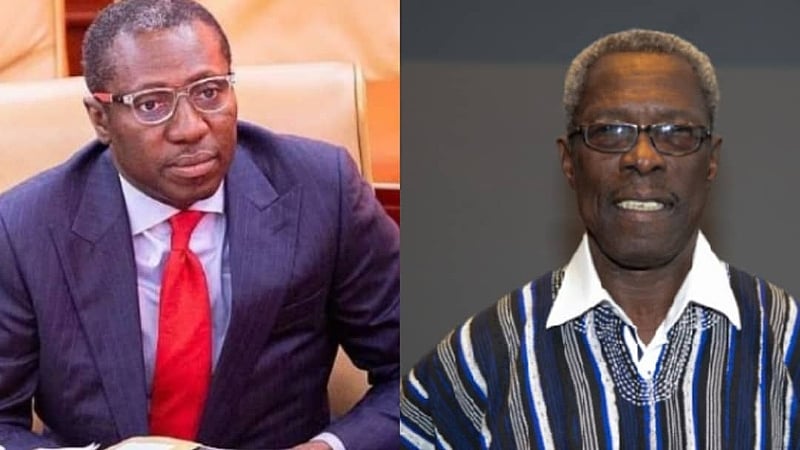Dr. Tony Aidoo, a prominent figure within the National Democratic Congress (NDC) and a former ambassador, has launched a pointed critique of Alexander Afenyo-Markin, the Minority Leader in Ghana’s Parliament. Aidoo argues that Afenyo-Markin’s self-proclaimed gentility clashes starkly with his aggressive and often confrontational demeanor, particularly during parliamentary proceedings. He characterizes this behavior as emblematic of a broader trend within the New Patriotic Party (NPP), suggesting that Afenyo-Markin embodies a type of cognitive dissonance, a psychological phenomenon where individuals attempt to reconcile conflicting beliefs or behaviors. Aidoo posits that Afenyo-Markin struggles to reconcile his self-image as a reasonable and gentlemanly figure with his aggressive tactics, resorting to downplaying or dismissing contradictory evidence of his behavior.
Aidoo illustrates his point by recounting Afenyo-Markin’s conduct during recent parliamentary vetting processes, highlighting what he perceives as unnecessarily boisterous language and disruptive actions. He contends that Afenyo-Markin, despite belonging to the minority party, continues to operate with an air of unwarranted authority, often resorting to verbal attacks and accusations. This behavior, Aidoo emphasizes, stands in stark contrast to Afenyo-Markin’s frequent pronouncements of his own reasonableness and gentlemanly conduct, creating a disconnect between his words and actions. Aidoo suggests that this dissonance stems from Afenyo-Markin’s difficulty accepting his party’s minority status, leading to an overcompensating aggression in an attempt to maintain a semblance of control and influence.
To further substantiate his claims, Aidoo draws upon past experiences, recounting an incident during his own appointment as Deputy Minister of Defence in 2008. He details how J.H. Mensah, a prominent NPP member at the time, attempted to access Aidoo’s confidential university records without any justification beyond a pre-determined opposition to his appointment. Aidoo criticizes this action as undemocratic and unbecoming of a parliamentarian, highlighting the preemptive nature of Mensah’s opposition and his unwillingness to engage in fair and open dialogue. This incident, according to Aidoo, exemplifies a pattern of behavior within the NPP, where personal attacks and underhanded tactics are prioritized over genuine debate and scrutiny.
Aidoo then narrates another incident involving Kwamena Bartels, a former NPP MP, who falsely accused him of disrespecting the then Speaker of Parliament, Justice D.F. Annan. Bartels alleged that Aidoo had insulted the Speaker in his office at Osu Castle, a location where the Speaker did not even have an office. Aidoo emphasizes the absurdity of the accusation, highlighting it as another example of the NPP’s tendency to fabricate narratives and distort facts to discredit their opponents. He points out that the Speaker himself later acknowledged the falsehood of the accusation, confirming Aidoo’s version of events and underscoring the lengths to which some NPP members would go to undermine their political rivals.
These anecdotes, in Aidoo’s view, underscore a broader pattern of behavior within the NPP, characterized by what he terms a “haughty” attitude and a misplaced sense of superiority. He argues that NPP politicians often present themselves as all-knowing, resorting to sophistry and misrepresentations to avoid addressing substantive issues. He characterizes their arguments as often lacking in substance, relying instead on diversions, falsehoods, and blame-shifting. This, according to Aidoo, is a defining characteristic of the NPP’s political strategy, a refusal to acknowledge their own shortcomings and a persistent tendency to project blame onto others.
Aidoo concludes by highlighting Afenyo-Markin’s recent targeting of the clerk of the parliamentary committee, accusing him of making unfounded allegations against someone who lacks the platform to defend themselves. He argues that this behavior is unacceptable for a parliamentarian and exemplifies the NPP’s tendency to exploit power imbalances to silence dissent and avoid accountability. He contrasts this behavior with the expected conduct of a parliamentarian, emphasizing the importance of respectful dialogue, reasoned debate, and a commitment to truth and fairness. Through these examples and his analysis of Afenyo-Markin’s conduct, Aidoo paints a picture of a political culture within the NPP that he believes is detrimental to democratic discourse and fair governance.


